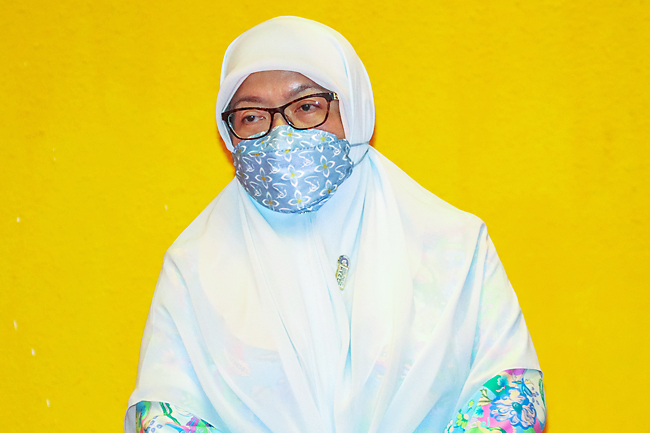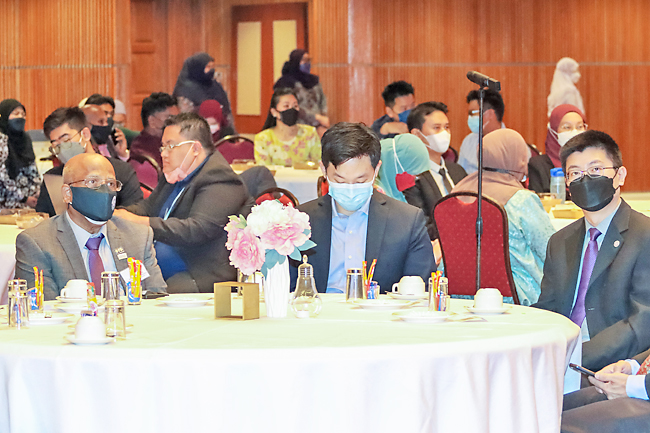Izah Azahari
Universiti Teknologi Brunei (UTB) – under the School of Applied Sciences and Mathematics (SASM); Centre for Research on Agri-Food Science and Technology (CrAFT); and Centre for Innovative Engineering (CIE) – yesterday co-organised the Borneo International Conference on Agrotechnology (BICAT) 2022, carrying the theme ‘Technology for Agriculture 4.0’.
The conference was held in conjunction with the Economy Week of the Brunei Mid-Year Conference and Exhibition 2022 (Brunei MYCE 2022), organised by the Ministry of Primary Resources and Tourism (MPRT) at the International Convention Centre (ICC) in Berakas. Parts of the conference were also held online.
Minister of Primary Resources and Tourism Dato Seri Paduka Dr Haji Abdul Manaf bin Haji Metussin was the guest of honour.
The event commenced with the recitation of Surah Al-Fatihah and Doa Selamat, followed by welcoming remarks by UTB Vice-Chancellor Professor Dr Hajah Zohrah binti Haji Sulaiman who highlighted that the conference allows for deliberations on the issues and opportunities of current and future technologies.
This includes sustainable and environmentally friendly agriculture – in providing food security for the growing population; and employment opportunity and economic growth – in meeting the strategies set for Brunei Vision 2035, she pointed out.



“The conference will undoubtedly serve as an avenue to establish networking and collaboration with interested agrotechnology sectors. This in turn benefits future academic research and development activities,” Professor Dr Hajah Zohrah said, before adding that the main outcome can be a strategic plan for collaborative research and development (R&D), student training in the agriculture sector and stakeholder engagement.
She also touched on UTB’s undergraduate degree programmes – including agrotechnology with a minor in business and food and science technology, adding that UTB’s curriculum, research and development activities are aligned with the global standards, the vision and mission of the MPRT, and Brunei Vision 2035.
“Both programmes will produce young Bruneians ready to serve the nation with skills and knowledge in modern agrotechnology and agriculture,” Professor Dr Hajah Zohrah said.
The guest of honour later delivered a speech, before officiating the BICAT 2022.
A multimedia presentation followed. The conference began with two plenary sessions by keynote speakers, with UTB Assistant Vice-Chancellor (Research) Professor Dr Mohamed Hasnain Isa as moderator.
The first session by President of the Economic Research Institute for ASEAN and East Asia Professor Hidetoshi Nishimura titled ‘Digital Pathways for Improving Productivity, Profitability, and Sustainability of Agrifood Systems’ examined how digital technologies are accelerating the transformation of the agri-food system by increasing farm efficiency; improving farmers’ access to output, input, and financial markets; strengthening traceability; and improving the design and delivery of appropriate agriculture policies.
Department of Agricultural, Food and Nutritional Science at the University of Alberta, Canada Chair Professor Heather Bruce delivered the second session titled ‘Enhanced Food Security Through Controlled Environment Agriculture,’ discussing precision agriculture that promises to improve animal health, forage use, animal feed efficiency, and cost of production in the beef industry through greater control of natural resources during extensive production.
The event continued with the ‘Digital Agriculture Eco Nursery Project between Brunei Darussalam and Japan’ virtual tour of the project site, hosted by the Director of Asia and Pacific Division, Ministry of Economy, Trade and Industry, Japan Ikeya Iwao.
Director of Margot Forde Forage Germplasm Centre, New Zealand Dr Kioumars Ghamkhar’s presentation on ‘Digital Agri-Technologies For Forage Improvement in New Zealand’ offered examples of technologies developed at AgResearch in New Zealand to address the use of digital agri-tech for quantification of plant phenotype that has surged dramatically in the past decade; digital technologies that help in process, consumables and equipment cost (such as quality measurement technologies); and the impact these technologies could have on mitigating environmental footprint by agricultural systems.
Conference participants delivered 21 papers, with the session chaired by Assistant Professor of Faculty of Engineering, Electrical and Electronic Engineering Dr Lim Tiong Hoo; Assistant Professor at the School of Computing and Informatics Dr Wida binti Susanty Haji Suhaili; and lecturer at the School of Applied Sciences and Mathematics Dr Aida Maryam binti Haji Basri.
Local and international researchers discussed among others advances in agrotechnology and aquaculture engineering applications; food and beverage processing; as well as halal food safety and processing.
In his closing speech, BICAT 2022 Organising Committee Chair Professor Dr Beston Nore highlighted that agriculture and farming have historically been the core labour drivers of the global economy, and that through modern agrotechnology farming, sustainable food production goals can be achieved.
Dr Beston also expressed hopes that relations between BICAT2022 participants will be further strengthened.






